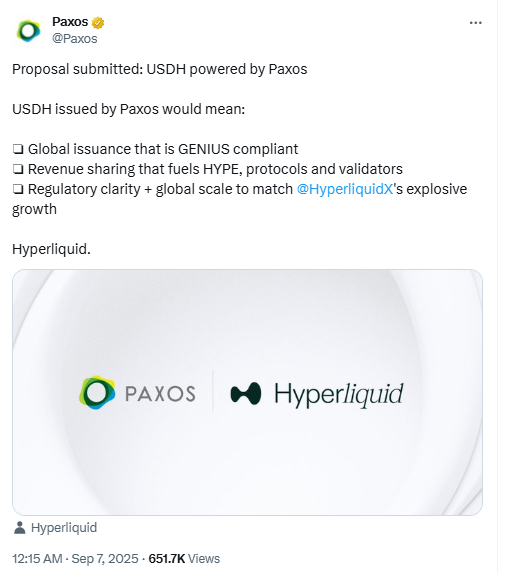Paxos submitted a proposal to launch USDH, a Hyperliquid-first stablecoin.
The company confirmed the stablecoin would comply with the GENIUS Act in the United States and the MiCA framework in Europe.
 Paxos Proposal on USDH Stablecoin. Source: X (@Paxos)
Paxos Proposal on USDH Stablecoin. Source: X (@Paxos)
According to the proposal, published on Saturday, 95% of the yield from USDH reserves will be allocated to buy back the HYPE token.
Paxos stated that the buybacks would be distributed across the Hyperliquid ecosystem, including users, validators, and partner protocols.
The announcement said:
“We propose the launch of USDH, a Hyperliquid-first, fully compliant stablecoin purpose built to drive adoption, align incentives, and anchor the ecosystem’s next era of growth.”
Paxos Labs Leads USDH and Acquires Molecular Labs
The project will be managed by Paxos Labs, a new division within Paxos. Paxos Labs has acquired Molecular Labs, the developer of Hyperliquid primitives LHYPE and WHLP.
This acquisition strengthens Paxos’ role in the Hyperliquid ecosystem and provides infrastructure knowledge of its onchain financial architecture.
By combining regulatory compliance with Hyperliquid technical expertise, Paxos Labs will focus on issuing USDH as a stablecoin that integrates directly with the Hyperliquid network.
The acquisition also ties Paxos more closely to the ecosystem’s existing tools and liquidity structures.
USDH Stablecoin Deployment on HyperEVM and HyperCore
The USDH stablecoin will be deployed across HyperEVM and HyperCore chains. Paxos stated this will link Hyperliquid to global banking rails and provide institutional entry points.
Paxos already works with over 70 financial partners and has operations in the United States, European Union, Singapore, Abu Dhabi, and Latin America. This network will serve as the base for USDH distribution.
Most of the yield from USDH reserves will go into HYPE buybacks. The mechanism will return value to builders, validators, and users within the Hyperliquid ecosystem. Paxos positioned this as a core feature of the stablecoin design.
HYPE Integration with Paxos Brokerage Network
Paxos also confirmed that the HYPE token will be integrated into its brokerage infrastructure.
This infrastructure already provides crypto services for PayPal, Venmo, and MercadoLibre. The addition of HYPE links Hyperliquid assets with existing Paxos partners.
Through this setup, HYPE becomes part of the same system that distributes supported assets to fintech platforms.
The integration of USDH and HYPE into Paxos operations places both within established distribution channels.
Hyperliquid Market Share and Revenue Growth
Hyperliquid currently dominates the decentralized perpetual futures sector. The platform generated $106 million in revenue last month from nearly $400 billion in trading volume.
This activity gave Hyperliquid a 70% share of the decentralized perpetual market, according to DefiLlama.
Only Uniswap and PancakeSwap recorded higher weekly trading volume during the same period.
The figures highlight Hyperliquid’s market position and scale, which serve as the foundation for the USDH stablecoin proposal.
Paxos aligned its plan with the largest ecosystem in decentralized perpetual futures, strengthening its role in regulated stablecoin issuance.

Editor at Kriptoworld
LinkedIn | X (Twitter)
Tatevik Avetisyan is an editor at Kriptoworld who covers emerging crypto trends, blockchain innovation, and altcoin developments. She is passionate about breaking down complex stories for a global audience and making digital finance more accessible.
📅 Published: August 4, 2025 • 🔄 Last updated: August 4, 2025

